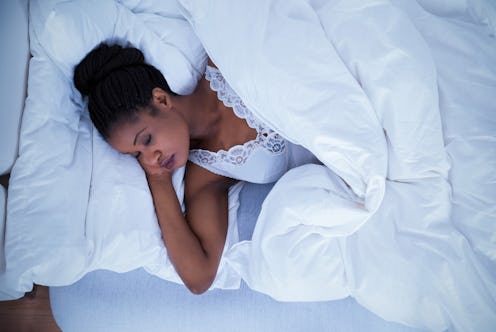Life
A New Study Says Both Sleeping Too Little AND Too Much Can Mess With Your Memory

Given how crucial getting good sleep is for, well, basically everything in life, you probably aim to get enough sleep at night. But a new study adds to previous research showing that sleeping too much can be as detrimental as not sleeping enough. Neither extreme is helpful, University of California at Los Angeles (UCLA) researchers say, since sleeping too much or too little can affect your memory in negative ways. When your nightly sleep schedule is off, both memory skills and reaction time can get compromised.
The study’s authors say that sleeping for longer than the recommended seven to eight hours each night led to poor memory recall and slowed reaction times in study subjects. The UCLA study, published in the International Journal of Epidemiology, is the first to examine if there are causal links between sleep times, dementia and cognitive ability, according to a press release. Researchers reported 5% more errors in a visual memory test in study participants who slept for less than seven hours a night. Those who slept for more than nine hours, however, made even more mistakes on the test — 9% for each additional hour of sleep. Excessive sleepers also had a 1% slower reaction time with each hour of extra sleep per night.
Lead study author and PhD candidate Albert Henry of the UCLA Institute of Cardiovascular Science said, “Our study provides new evidence that both short and long sleep may have a negative impact on certain cognitive domains, such as visual memory and reaction time."
“This is the first time that we were able to assess a person’s lifelong sleep duration in relation to cognitive function, as opposed to only looking at how sleep is linked to these outcomes at only one point in time,” said senior study author Dr. Victoria Garfield.
According to a 2013 study published by the American Physiological Society, the reasons why sleep helps memory may have to do with how memories are consolidated in the brain. During the consolidation process of memory function, memories are stabilized and made easier to retrieve later. Certified pediatric sleep consultant Ricki Taubenblat told Carolyn Steber in a previous Bustle story that reaction times are also at risk of impairment when you’re sleep deprived: “Studies show that the cognition levels of drunk people and sleep deprived people are the same,” she said.
Unfortunately, Taubenblat said, it can be difficult to tell when you're too tired to drive. “Lower energy levels and cognitive alertness become the norm until the person doesn't realize the low level they are using as a baseline,” she said. “Driving on less than five hours of sleep increases your risk for an accident threefold.”
When it comes to too much sleep or not enough, researchers say that sticking to the recommended guidelines is key to memory performance and healthy reaction times overall. While some health conditions may require longer than average sleep times, for healthy adults, UCLA researchers recommend getting about seven or eight hours of sleep each night for optimal functioning.